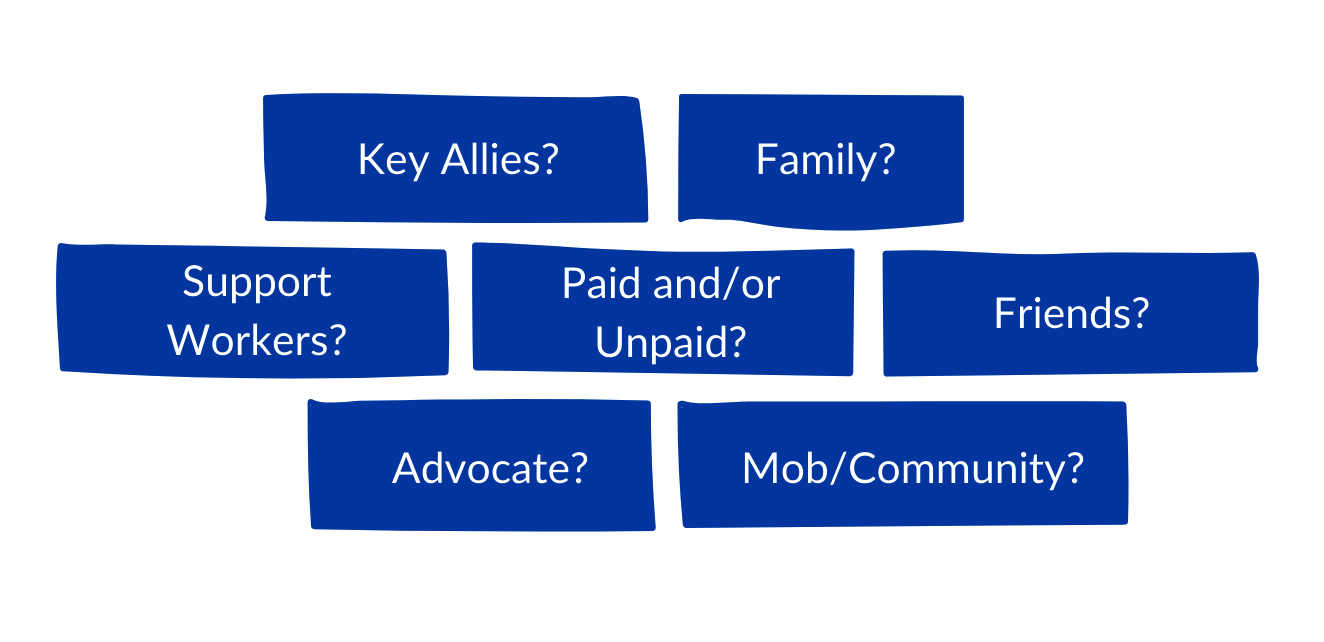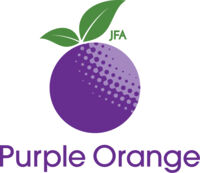Please login or register for an account to get started on building your SKILLs!
Design Your Supports
Key Learnings
- To achieve your goals you must choose your supports
- Informal support is provided by family and friends
- Formal support is paid for through your NDIS plan

Choice and control are two words you hear a lot in the NDIS. Choice and control includes having the power to direct the supports in your plan yourself. In this module we will talk about how to use your individualised NDIS plan to reach your goals in the way you choose to. This starts with identifying the types of supports you need…
What Supports Do I Need?
What things do you need support with every day? Maybe you need help to shower, get ready, stick to a routine or get around. And what things do you need to help you develop your skills? This might include some training, technology for reminders, or help planning things.
No one achieves their goals without support – whether that be from family, friends, partners, children, our community, teachers or training courses. We all need different things, so it is important that our teams and equipment are specific to our needs and goals.
Think back to the supports we started to look at in the previous topic. Is there anything that you might’ve left out or would like to add now? Keep this in mind when you fill out the question below.
Let’s now look at options for support that can help you can reach your goals.

There are many options for support. These can include:
- Informal and unpaid relationships you already have with people in your life.
- Mainstream services available in your community, e.g. Centrelink, education, health, public transport and other programs available to everyone.
- Community groups, projects and centres in your local area that could form part of your overall support ‘package’.
Paid supports are to be used for gaps in your support where additional help is needed. These include:
- Other funding avenues if appropriate, e.g. insurance claims, eligibility to small grant schemes from organisations.
- NDIS funded supports that help you fulfill your individualised NDIS Plan.
Let’s explore these sources of support further, so you can decide what to include in your personalised NDIS plan.
Unpaid or Informal Support - Your Allies
The NDIS call support provided by family and friends ‘informal support’. This support, provided by parents, siblings, partners, carers, and other family members, is vitally important to people living with disability.
The ongoing capacity of family members and carers to provide these informal supports can often be critical to the wellbeing of people living with disability. The NDIS use the planning process to build an understanding of a person’s overall support needs. This includes identifying the range of informal supports they have available and how they can be sustained.
There can be huge benefits of having allies in your life, including vision sharing, practical assistance, social and emotional support and advocacy. The video below is a great example of the role allies can play in supporting opportunity and choice.
Mainstream and Community
Mainstream and community supports are available to all members of Australian society. They are non-disability specific services and organisations, such as Medicare, mental health services, schooling, housing, transport and community infrastructure.
The NDIS is intended to work with and alongside these supports, not replace them. This is why they explore what supports are currently being provided, or should reasonably be provided, by informal, community and mainstream support systems during the NDIS planning process.
Other funding examples also exist, like eligibility to small grant schemes from community minded organisations. In South Australia the Julia Farr Trust Fund administers three trust funds designed to assist people living with disability. Two other organisations that offer grants in South Australia are The Wyatt Trust and the Adelaide Benevolent Society.
Peer Support
A peer support network is where people get together as equals to provide support to each other because of similar experiences or circumstances in their life. There is evidence that peer support can help people feel more confident, knowledgeable, capable, and less isolated. Peer groups also offer a great way to build connections with people living with disability, and sometimes family members of people living with disability.
Joining a network provides access to a group of people you can talk to about things that are important to you, and who you can share information with and learn from. You can also work together with your network to advocate for things that are important to you.
Many Peer Support Networks now meet online and in-person. Check out the Peer Connect website to learn more and join one today!
Following on from these SKILL topics, you can also join the SKILL Workshops & Peer Support Group on Facebook and connect with a SKILL Peer Support Group in your area. Get started by emailing andrewg@purpleorange.org.au.

The NDIS is currently updating their processes and procedures to reflect the changes to the NDIS legislation.
Please visit the link below on the NDIS website to get their latest information on understanding and using your NDIS Plan. Information on some pages may change as they are updating their website.
For participants: how the planning process works, creating your plan, using your plan
Key Points About Supports in Your NDIS Plan
The NDIS is not perfect. No system ever is. It is a relatively new and evolving scheme - but it is providing more supports to more people living with disability in Australia than ever before.
The NDIS is trying to provide a high level of flexibility to the people it supports, but it still needs to be uniform, fair and consistent at the same time. This means there may be situations where you need to express your needs to the NDIS if you are not satisfied with how things are. To help with this we will look at ADVOCACY skills in Topic 4 - Safeguarding Your Success.
Congratulations, you have completed Topic 2! You have learnt about:
- how to develop an NDIS plan
- NDIS processes and supports
- types of paid and unpaid supports
- designing your supports to fulfil your vision
Next up, in Topic 3, we look at how to manage these supports so you can live your best life!


